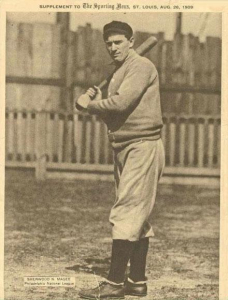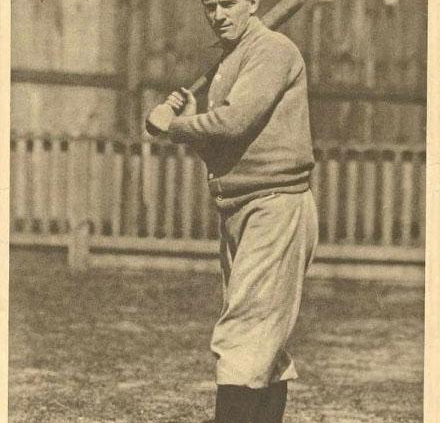July 10, 1911: Phillies’ Sherry Magee assaults umpire after disputed call
“Magee came up to bat next, threw his bat on the ground, and started to call me names. He is bad when irritated—and tolerably easy to irritate, as shown by the way he knocked down Finneran, the umpire, last season.” – Christy Mathewson, Pitching in a Pinch (1912)1
 During the third inning of a Philadelphia Phillies-St. Louis Cardinals game on July 10, 1911, Phillies left fielder Sherry Magee punched and knocked down umpire Bill Finneran after disputing a called third strike. The episode tarnished Magee’s reputation and perhaps overshadowed a statistical ledger that rates him as one of the Deadball Era’s best all-around position players.
During the third inning of a Philadelphia Phillies-St. Louis Cardinals game on July 10, 1911, Phillies left fielder Sherry Magee punched and knocked down umpire Bill Finneran after disputing a called third strike. The episode tarnished Magee’s reputation and perhaps overshadowed a statistical ledger that rates him as one of the Deadball Era’s best all-around position players.
Philadelphia came into its four-game series with St. Louis as a legitimate contender for its first National League pennant, clinging to a half-game lead over the defending NL champion Chicago Cubs and a one-game advantage over the New York Giants.
The Cardinals, led by player-manager Roger Bresnahan, were in fifth place, 4½ games behind Philadelphia. They had just lost two of three to Honus Wagner and the fourth-place Pittsburgh Pirates.
Nonetheless, St. Louis played well against the Phillies and won the first three games of the series while outscoring Philadelphia 28-15. Led by Rube Ellis’s four-hit day on July 6, the Cardinals won the first game in a slugfest. St. Louis took the second and third games behind complete-game efforts from Bob Harmon and Bill Steele.
With Sunday baseball banned in Pennsylvania, July 9 was an offday, and the Phillies called upon burgeoning ace Grover Cleveland Alexander for the series’ final game. Alexander, a 24-year-old Nebraska farmboy in his rookie season, had won six games in June but gave up six runs and took the loss in the series opener. It was only the second time in 20 starts that Alexander, who entered with a 16-5 record, had not pitched a complete game.2
The Cardinals countered with 22-year-old right-hander Roy Golden. Born in Madisonville, Ohio, Golden had a two-year major-league career, making 37 appearances for the Cardinals in 1910 and 1911.
The Cardinals struck first in the opening frame. Second baseman Miller Huggins led off with a single and advanced to third on a single by shortstop Arnold Hauser. Huggins scored on Ellis’s groundout to first for a 1-0 lead.3
St. Louis maintained that lead into the bottom of the third. After retiring Phillies catcher-manager Red Dooin to open the inning, Golden lost control and walked Alexander, second baseman Otto Knabe, and center fielder Dode Paskert to load the bases. The Philadelphia Inquirer reported that Golden “pitch[ed] ten balls before he ever got a strike over the plate.”4 Third baseman Hans Lobert singled to right to score Alexander and Knabe and give the Phillies a 2-1 lead.
That brought up Magee with men on first and second and one out. In 1910 Magee had a superb season, winning the NL batting title with a .331 average, finishing fourth in stolen bases with 49, leading the league in total bases, and walloping 39 doubles, 17 triples, and 6 home runs.5 The 26-year-old Magee was putting together another strong season in 1911 and came into the game slashing .299/.387/.496.
On this occasion, Golden worked Magee to a 2-and-2 count. The next offering appeared high – The Camden (New Jersey) Morning Post described it as on a level with Magee’s head6 – but Finneran called it a strike.
Enraged, Magee threw his bat in the air as he walked toward the Phillies’ bench. Finneran, in his first year as a National League umpire after five years in the Eastern League, promptly ejected him.7
Magee turned and rushed for Finneran. After a short argument between the men, “[w]ith a mighty short left swing, Magee caught Finneran just above the jaw [and] Finneran sank to the ground as though he had been struck by lightning.”8
The blow knocked Finneran cold.9 Players and umpire Cy Rigler rushed toward Finneran, and the crowd of 3,000 swarmed the field. Lobert and Paskert ran around the bases, mistakenly thinking time had not been called.
Finneran rose to his feet, “ripped off his breast protector,” and charged at Magee.10 Players grabbed Finneran to prevent him from reaching Magee, and eventually persuaded him to leave the field and receive medical attention. Finneran did not return to the game.
After order had been restored, Golden struck out first baseman Fred Luderus for the third out.11
Philadelphia mounted another rally in the fourth. Right fielder Fred Beck, making his Phillies debut after being picked up from Cincinnati, opened the frame with a single. Shortstop Mickey Doolin walked. With two men on and nobody out, Golden threw a wild pitch that advanced Beck and Doolin by a base.
Golden’s wildness prompted Bresnahan to replace him with Rube Geyer. Red Dooin greeted Geyer with a double to left-center that scored Beck and Mickey Doolin for a 4-1 Philadelphia lead. Geyer recovered to strand Dooin at second by retiring the next three batters.
Now with the lead, Alexander did not allow St. Louis to score again until the eighth. After Hauser struck out and Ellis lined out to first, first baseman Ed Konetchy doubled to left and scored on right fielder Steve Evans’ single. Alexander struck out third baseman Mike Mowrey to end the inning.
Alexander returned in the ninth to finish off the game and salvage the final game of the series for Philadelphia. He scattered eight hits with two walks in his 19th complete game of the season.
After the game, Magee told reporters that Finneran not only used foul language toward him but also attempted to hit him first, causing Magee to punch him in self-defense.12 Finneran denied he said anything to Magee other than words ordering him to the clubhouse.13 Speaking to Lawrence Ritter for The Glory of Their Times more than 50 years after the game, Lobert recalled another potential explanation for Magee’s actions: Magee had been drinking the night before and was hungover.14
Papers reporting on the game condemned Magee for his actions, with the Philadelphia Inquirer asserting, “[W]e feel duty bound to express our disapproval of Magee’s action … as no matter what the provocation, there is no excuse for a player striking an umpire on the field of play and thus bringing disgrace to the great game.”15 The Lebanon (Pennsylvania) Daily News piled on, saying Magee “caused one of the most disgraceful scenes ever witnessed at a ball park.”16
National League President Tom Lynch, a former umpire himself, came to Philadelphia the next day to investigate the incident.17 Lynch suspended Magee for the remainder of the season and fined him $200.18 The suspension angered the Phillies, and under pressure Lynch reinstated Magee, effective August 16.
The Phillies, who ended play on July 10 only a half-game behind Chicago, limped to a 13-16 record without Magee and fell 6½ games behind the Cubs.
Magee played well in his return, hitting seven of his 15 home runs after the reinstatement. The Phillies finished in fourth, 19½ games behind the pennant-winning Giants and only 2½ games ahead of the fifth-place Cardinals.
Magee’s playing career in the majors lasted through the 1919 season. His final at-bats were in that October’s World Series as a member of the champion Cincinnati Reds, who were managed by his former Phillies teammate Pat Moran.
After being ejected 14 times between 1907 and 1911, Magee apparently got a better handle on his temper. He was not run from another game until May 23, 1914, when Cy Rigler thumbed him for disputing ball-and-strike calls. In his final six seasons (1914 through 1919), Magee was ejected five times.
He retired with a career .291 batting average and 137 OPS+. Between 1905 and 1915, Magee ranks fourth among position players in Wins Above Replacement according to Fangraphs, behind only Honus Wagner, Ty Cobb, and Eddie Collins, and ahead of Tris Speaker and Nap Lajoie, all members of the National Baseball Hall of Fame.19
As it happened, Magee’s baseball journey even included service as an umpire – in the minors in 1927, then in the NL during the 1928 season – but he died of pneumonia at age 44 in March 1929.
Acknowledgements
This article was fact-checked by Kevin Larkin and copy-edited by Len Levin.
Sources
In addition to the sources cited in the Notes, the author consulted Baseball-Reference.com and Retrosheet.org for pertinent information, including the box score and play-by-play.
https://www.baseball-reference.com/boxes/PHI/PHI191107100.shtml
https://www.retrosheet.org/boxesetc/1911/B07100PHI1911.htm
Notes
1 Christy Mathewson, Pitching in a Pinch (New York: Grosset & Dunlap, 1912), 18-19.
2 Alexander had one of the greatest rookie seasons ever, going 28-13 with a 2.31 ERA, good for 7.2 Wins Above Replacement according to Fangraphs and 7.7 Wins Above Replacement according to Baseball Reference.
3 The summary of the first inning comes from Jim Nasium, “Enraged Over Decision, Magee Assaults Umpire; Phillies Win 4-2,” Philadelphia Inquirer, July 11, 1911: 10. Jim Nasium was the nom de plume of Edgar Forrest Wolfe, a sportswriter and cartoonist for the Inquirer and other newspapers from 1898 to 1929.
4 Jim Nasium.
5 His 39 triples and 17 doubles were good for second in the National League, while his 10 home runs were fifth in the National League.
6 “Magee Assaults Umpire Finneran,” Camden (New Jersey) Morning Post, July 11, 1911: 8.
7 Although Finneran was a rookie umpire, there is no sense from the coverage of the incident that his lack of experience played a role. Instead, his call was another frustrating call that prompted Jim Nasium of the Philadelphia Inquirer to comment that Magee had been angered by some of the National League umpires’ calls during the season.
8 “Finneran Knocked Out By S. Magee,” St. Louis Globe-Democrat, July 11, 1911: 7.
9 Jim Nasium.
10 “Finneran Knocked Out by S. Magee.”
11 Jimmy Walsh replaced Magee in left field. The utilityman grounded out and lined out in his two plate appearances.
12 “Magee Assaults Umpire Finneran.”
13 “Magee Assaults Umpire Finneran.”
14 Lawrence Ritter, The Glory Of Their Times (New York: HarperCollins Publishers, 2010), 194-95.
15 Jim Nasium.
16 “Strikes Umpire,” Lebanon (Pennsylvania) Daily News, July 11, 1911: 2.
17 “Magee’s Outbreak Starts Lynch on the Warpath,” St. Louis Globe-Democrat, July 11, 1911: 7.
18 “Limit Is Imposed on Player Magee,” Scranton Tribune, July 12, 1911: 11.
19 Baseball-Reference.com’s WAR formula ranks Magee seventh among position players during that span. The Veterans Committee considered Magee for the Hall of Fame in December 2008, but he did not receive enough votes for election.
Additional Stats
Philadelphia Phillies 4
St. Louis Cardinals 2
Baker Bowl
Philadelphia, PA
Box Score + PBP:
Corrections? Additions?
If you can help us improve this game story, contact us.


